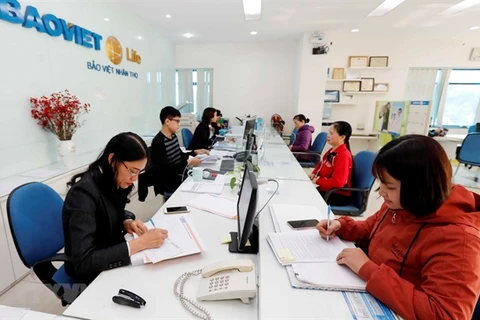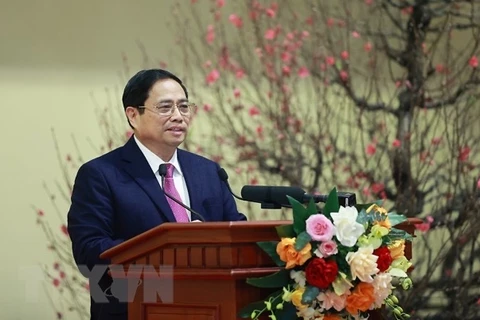Hanoi (VNA) - Global turmoil caused 2022 to be a challenging year with unprecedented difficulties facing the banking industry. But it has responded relatively well, contributing to controlling inflation and stabilizing the macro-economy.
The year 2022 was an important year, which saw a positive recovery and a safe and effective response to the Covid-19 epidemic, especially in the context of the upheaval experienced by the region, and the world.
Unprecedented developments which were impossible to forecast, caused a change in the socioeconomic development plan formulated by international organizations and countries in early 2022. Competition between major countries was increasingly fierce, the protracted Russia-Ukraine conflict, inflation, an increase in interest rates, tightened monetary policy, and the appreciation of the dollar internationally all served to complicate the economic picture.
Domestically, the price of gasoline and commodities fluctuated, inflation, the corporate bond market, and real estate have had a tumultuous impact on monetary and banking activities.
The State Bank of Vietnam (SBV) developed a comprehensive assessment report on all aspects of the banking industry for 2022.
Specifically, the flexible monetary policy contributed to keeping inflation low (3.15% on average), and spurred the recovery of economic growth to a high level (8.02%).
Credit increased by 14.5%, foreign exchange markets were stable as the VND depreciated by 3.5%, and interest rates increase by 1%/year.
In particular, in November 2022, the US Department of the Treasury removed Vietnam from the list of advanced monitoring for currency manipulation, and at the same time, recognized the State Bank of Vietnam’s management of monetary and exchange rate policies.
The State Bank said it has revised up operating interest rates twice with a total increase of 2%/year. The maximum deposit interest rate in VND with a term of less than 6 months at credit institutions increased by 0.8%-2%/year (on September 23 and October 25, 2022). The SBV also increased the maximum lending interest rate in VND by 1% per year for priority sectors (on October 25, 2022).
These were timely solutions, in line with the general trend around the world to prioritize inflation control.
The moves were also carried out to stabilize the foreign currency market, create room to adapt to market fluctuations, and contribute to macroeconomic stability.
The State Bank also directed credit institutions to reduce operating costs, administrative procedures and unnecessary expenses to create room to reduce lending interest rates and ease the strain on citizens and businesses.
The State Bank monitored deposit interest rates at their peak, as some banks eclipsed the 12% mark, pulling lending rates higher.
In order to stabilize the market, in mid-December 2022, the State Bank and the Vietnam Banks Association called on commercial banks to reduce the deposit interest rate at all terms to no more than 9.5%/year (including promotions) and reduce the loan interest rate by 0.5%-2%.
 Proactive and flexible monetary policy has contributed to boosting import and export turnover. (Photo: Reporter/Vietnam+)
Proactive and flexible monetary policy has contributed to boosting import and export turnover. (Photo: Reporter/Vietnam+) The State Bank’s "call" was effective. Immediately, a series of banks announced a reduction in deposit interest rates from 0.5%-1% and listed at 9.5 %/year for lending rates.
In addition, many banks announced a reduction in lending interest rates. Some banks reduced interest rates by up to 3.5% to support individual and corporate customers, especially during the Lunar New Year./.
























